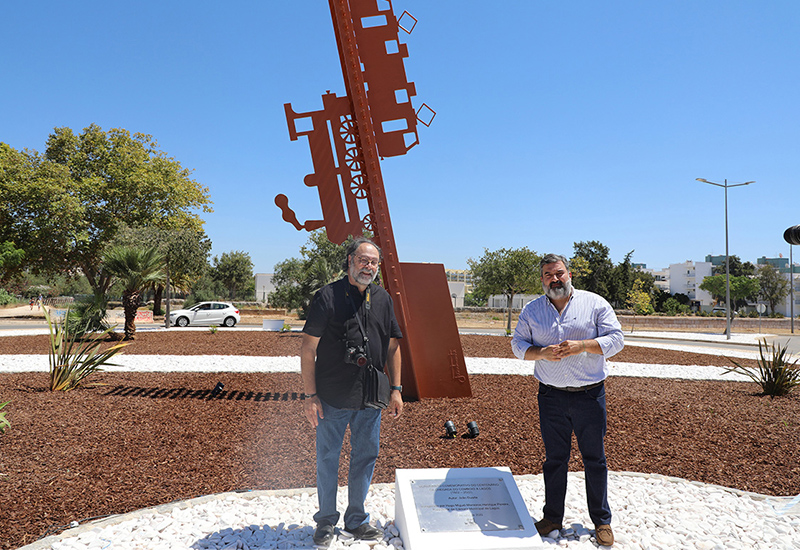At the end of July this year, Lagos commemorated a momentous event: the centenary of the arrival of the train to the city.
In our age of accessible transport, be it by car on fast motorways, hopping on an intercity train or jetting off on an aeroplane, the arrival of a locomotive at a provincial train station might not be such a big deal. Think again. It was an event that had significant implications for the economic and social development of a neglected region in urgent need of a boost.
We mustn’t forget that it was the creation of the steam engine by James Watt in 1776 that led to the development of a new revolutionary means of land transport: the train and the railroad. The initial fear caused by the enormous, noisy engines soon gave way to a fascination with its power and potential. It reduced distances, connected people and places and became a more efficient means of transporting goods.
The developments didn’t bypass Portugal. Thanks to the young, forward-looking King D. Pedro V, the train arrived in Portugal. As a result, the first railway line connecting Lisbon and Carregado was inaugurated in 1858. The rail network expanded during the 19th and 20th centuries, easing travel and transport. But what was happening in Lagos?


At the time, it was an important centre for fishing and canning. Additionally, it produced large quantities of almonds, figs, carob, wine, brandy, and eggs, all needing to be transported by boat or horse and cart under challenging circumstances. Therefore, an extension of the train line to Lagos was essential.
In a communique for the centenary celebrations, Lagos Council points out that “the process of making the desired (train) connection come true was difficult and torturous.” The country’s south was isolated and far from the decision-making centres, which delayed developments.
In 1883, the railway line to the Algarve was on the agenda, and the line to Lagos was projected to begin in 1899. While the train arrived in Faro as promised that year, legal wranglings, promises and backtracking held back progress. The railway line snaked its way along the Algarve, arriving in Silves in 1902, Ferragudo in 1903, and Portimão in 1915. It took nearly 20 years for the final 17 kilometres of the line between Portimão and Lagos to be completed. Finally, on the 30th of July 1922, at precisely 11.30 that day, the train arrived at Lagos station with a delegation of ministers, senators, Algarve deputies and railroad leaders.
The jubilant population of Lagos welcomed the train with fanfare, followed by three days of celebration. The paper O Século reported that “the population experienced hours of delirious enthusiasm with more people arriving all the time.” Despite the delays, the Lagos line significantly boosted the region’s industrial and commercial development. It changed people’s daily lives, breaking down isolation, shortening distances and creating new job opportunities.
The centenary celebrations in July this year acknowledged the event’s significance and ensured further developments. On the 29th of July, Hugo Perreira, the President of the Lagos City Council and Joaquina Matos, the President of the Municipal Assembly, opened the proceedings at the Cultural Centre. In addition, contributions were made by representatives of the railway authorities (CP), Infrastructures of Portugal (IP), and the National Railway Museum, amongst others.
Not surprisingly, on the morning of the 30th of July, a commemorative train arrived at Lagos station, met by music and great cheer. A statue by João Duarte was also inaugurated on the island between the old and the new station.

At the beginning of the 20th century, engineer António da Conceição Parreira built the passenger terminal, the rolling stock depot (cocheira), a turntable and a housing area for railway workers. The station was considered one of the most beautiful in the Algarve, with azulejo tiles covering the front of its facades. These tiles, with a raised vegetal pattern, in shades of green, are typical of Art Nouveau and part of the rich Portuguese tile heritage.
The station was closed in 2006, making way for a new, up-to-date one, only 200 metres away. Unfortunately, the old station was left abandoned, causing concern for many in the city. The consensus was that the iconic building should be recovered as a unique treasure, but it was not to be – until now. Belonging to the Infrastructures of Portugal, it has been sold as “an autonomous building” to a private investor responsible for its restoration. The Council stresses that “the works which have started aim to allow the building to function in the future as a multidisciplinary space, combining commercial and cultural aspects.” We look forward to seeing the outcome.



Another piece of good news is that the abandoned Railway Museum on the land behind the station will be restored based on the partnership formalised between the municipality of Lagos and the National Railway Museum Foundation. Inexplicable to many observers, the museum was closed for years, only opening temporarily in 2007.
The museum contains some rare pieces. Beyer Peacock shipped 69 locomotives to Portugal between 1860 and the early 1900s. Only eight survived, and two are in the Lagos museum. The municipality will be responsible for renovating the old coach house. The National Railway Museum Foundation will manage the nucleus and restore the collection piece by piece.
And what about the surrounding area that seems to have been for sale for a long time? The Council spokesperson tells me that “it was sold to individuals by Infrastructures of Portugal and is, according to the Strategic Plan for this area of the city, intended for the construction of hotel units.” Further investigation confirms that the Mercan Group will build the ‘Lagos Marina Complex Hotels,` consisting of a 4-star hotel and a 3-star aparthotel. It is perhaps debatable if Lagos needs yet another tourist development, but the Council argues it will give new impetus to the area.
There are more innovations in store. For example, the electrification of the Lagos-Tunes line is due, and according to government sources, the whole of the Algarve railway line will be entirely electrified by 2024.
Perhaps the people cheering the arrival of the train to Lagos a hundred years ago had no inkling of the impact it would have. Valuing past efforts and safeguarding the heritage as the Council is now doing is essential, and so is paving the way for new developments.














